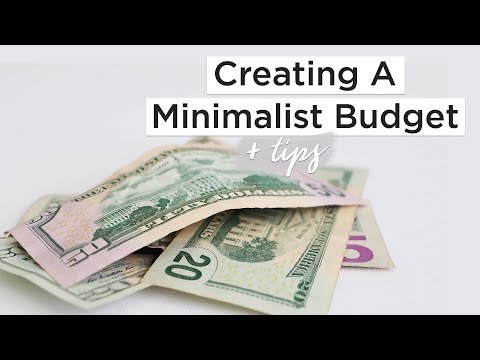Are you tired of struggling to make ends meet? Do you want to take control of your finances and live a simpler, more fulfilling life? Look no further! In this article, we will share some invaluable tips for creating a minimalist budget that will not only help you save money, but also enable you to live within your means and reduce financial stress. By incorporating these practical strategies into your daily life, you can achieve financial freedom and peace of mind. So, let’s dive in and explore the secrets to successfully managing your money while embracing a minimalist lifestyle.
Tips for Creating a Minimalist Budget
Introduction
Creating a minimalist budget can be a powerful way to take control of your finances and simplify your life. By focusing on your essential needs and eliminating unnecessary expenses, you can free up money for your priorities and achieve your financial goals more efficiently. In this article, we will explore effective tips for creating a minimalist budget that will help you streamline your expenses and live a more intentional life.
The Benefits of a Minimalist Budget
Before we delve into the specific tips for creating a minimalist budget, let’s take a moment to understand the benefits it can offer:
1. Financial Freedom: A minimalist budget allows you to allocate your resources mindfully, ensuring you have enough to cover your needs while saving for the future and reducing debt.
2. Simplicity: By eliminating unnecessary expenses, a minimalist budget simplifies your financial life, reducing stress and making it easier to manage your money effectively.
3. Improved Focus: By aligning your spending with your values, a minimalist budget helps you prioritize what truly matters to you, enabling you to focus on achieving your goals.
4. Reduced Clutter: By spending less on unnecessary items, you can declutter your physical space, leading to a more organized and tranquil living environment.
5. Environmental Impact: Embracing minimalism often involves adopting a more sustainable lifestyle, as you consume less and reduce your carbon footprint.
Identify Your Financial Goals
Before diving into the details of creating a minimalist budget, it’s important to identify your financial goals. Knowing what you want to achieve will provide the motivation and direction necessary to create an effective budget. Start by asking yourself the following questions:
1. What are my short-term and long-term financial goals?
2. Do I want to save for a specific purchase, build an emergency fund, or pay off debt?
3. How much do I need to allocate towards each goal every month?
Once you have a clear understanding of your financial objectives, you can tailor your minimalist budget accordingly.
Track Your Expenses
To create an effective minimalist budget, you need to have a comprehensive understanding of your current spending habits. Start by tracking your expenses for a month or two, including both fixed and variable costs. Use a budgeting app or create a spreadsheet to categorize your expenses and calculate the average amount spent in each category. This process will allow you to identify areas where you can cut back and eliminate unnecessary expenses.
Eliminate Non-Essential Expenses
One of the core principles of a minimalist budget is to eliminate non-essential expenses. This doesn’t mean you need to give up all luxuries or pleasures, but rather to make conscious choices about what truly brings you joy and aligns with your values. Here are some examples of non-essential expenses you might consider reducing or eliminating:
1. Dining out at expensive restaurants
2. Subscriptions to multiple streaming services
3. Impulsive shopping for unnecessary items
4. Paying for a gym membership you rarely use
5. Excessive spending on entertainment and leisure activities
By cutting back on these non-essential expenses, you can allocate more of your budget towards your goals and the things that truly matter to you.
Focus on Essential Needs
When creating a minimalist budget, it is essential to focus on your essential needs. These are the expenses required for your basic well-being and include categories such as housing, utilities, transportation, groceries, and healthcare. Start by allocating a fixed percentage of your income towards these essential needs, ensuring you have enough to cover them comfortably.
Housing:
– Evaluate your current housing situation and consider downsizing if necessary.
– Look for ways to reduce your rent or mortgage payments, such as finding a roommate or refinancing your mortgage.
– Reduce energy consumption by optimizing insulation, using energy-efficient appliances, and practicing mindful energy usage.
Transportation:
– Consider alternative transportation methods like biking, walking, or using public transportation.
– If you own a car, evaluate whether it is necessary and consider downsizing to a more affordable and fuel-efficient vehicle.
– Minimize maintenance costs by regularly servicing your vehicle and practicing safe driving habits.
Groceries:
– Plan meals in advance and create a grocery list to minimize impulsive purchases.
– Buy in bulk whenever possible to take advantage of discounts.
– Consider cooking at home more often and reducing the frequency of eating out.
Healthcare:
– Review your healthcare insurance plan to ensure it aligns with your needs and offers the best coverage at an affordable price.
– Take preventive measures to maintain good health, such as exercising regularly and following a balanced diet.
Automate Savings and Debt Payments
To ensure you stay on track with your financial goals, automate your savings and debt payments. Set up automatic transfers to your savings account and allocate a specific amount of your income towards debt repayment each month. By automating these processes, you eliminate the temptation to spend the money elsewhere and ensure consistent progress towards your goals.
Review and Adjust Regularly
A minimalist budget is not a one-time creation; it requires regular review and adjustment. Life circumstances change, goals evolve, and unexpected expenses may arise. Set aside time every month or quarter to review your budget, track your progress, and make necessary adjustments. This proactive approach will help you stay on top of your finances and ensure that your budget remains effective and aligned with your priorities.
Creating a minimalist budget is a transformative step towards financial freedom and a more intentional life. By following the tips outlined in this article, you can streamline your expenses, focus on what truly matters, and achieve your financial goals more efficiently. Remember, minimalism is not about deprivation but rather about aligning your spending with your values and priorities. Embrace the journey and enjoy the sense of freedom and control that comes with a minimalist budget.
MINIMALIST BUDGETING TIPS ???? | How To Save Money + Set Up a Simple Budget
Frequently Asked Questions
Frequently Asked Questions (FAQs)
1. What are the benefits of creating a minimalist budget?
Creating a minimalist budget can help you simplify your finances, reduce stress, and focus on your financial goals. It allows you to prioritize your spending, eliminate unnecessary expenses, and save money for important things in life.
2. How do I start creating a minimalist budget?
To start creating a minimalist budget, begin by tracking your expenses and identifying essential and non-essential spending. Eliminate unnecessary expenses and prioritize your needs over wants. Set specific financial goals and allocate your money accordingly to align with those goals.
3. Is it possible to maintain a social life while on a minimalist budget?
Yes, it is possible to maintain a social life while on a minimalist budget. Look for low-cost or free activities to do with friends, such as having a picnic in the park or organizing a game night at home. Be open and honest with your friends about your financial goals, and they will understand and support your choices.
4. What are some effective ways to reduce monthly expenses on a minimalist budget?
Some effective ways to reduce monthly expenses on a minimalist budget include cutting down on dining out, canceling unused subscriptions, minimizing energy consumption, shopping for discounts and deals, and embracing a more frugal lifestyle. Prioritize needs over wants and question every expense to ensure it aligns with your financial goals.
5. How can I resist the temptation of impulsive buying while on a minimalist budget?
To resist the temptation of impulsive buying, it can help to practice mindful spending. Take a moment to reflect on your purchases and evaluate if they align with your goals and values. Create a 24-hour waiting period before making non-essential purchases and consider the long-term impact of your buying decisions.
6. Can I still save money while on a minimalist budget?
Absolutely! In fact, saving money is one of the key principles of a minimalist budget. By eliminating unnecessary expenses and consciously prioritizing your spending, you can free up more money to put towards savings. Set specific savings goals and allocate a portion of your income each month towards building an emergency fund or achieving your financial objectives.
7. What are some common mistakes to avoid when creating a minimalist budget?
Some common mistakes to avoid when creating a minimalist budget include underestimating expenses, not setting realistic goals, not regularly reviewing and adjusting your budget, and succumbing to the pressure of keeping up with others’ spending habits. It’s important to be flexible, patient, and willing to make adjustments as needed to stay on track with your financial objectives.
8. How long does it take to see the benefits of a minimalist budget?
The time it takes to see the benefits of a minimalist budget varies for each individual. However, by adopting a minimalist budget and consistently practicing mindful spending, you can start experiencing positive changes in your finances within a few weeks or months. The key is to stay committed and make conscious choices that align with your financial goals.
Final Thoughts
Creating a minimalist budget can be a transformative step towards financial freedom. Start by analyzing your expenses and identifying areas where you can cut back without sacrificing your needs. Set realistic financial goals and prioritize your spending accordingly. Embrace the concept of mindful spending and practice self-discipline when making purchasing decisions. Automating your savings and tracking your expenses diligently can help you stay on track. Remember to periodically review and adjust your budget as needed. By incorporating these tips for creating a minimalist budget into your financial routine, you can take control of your finances and achieve your financial goals.



